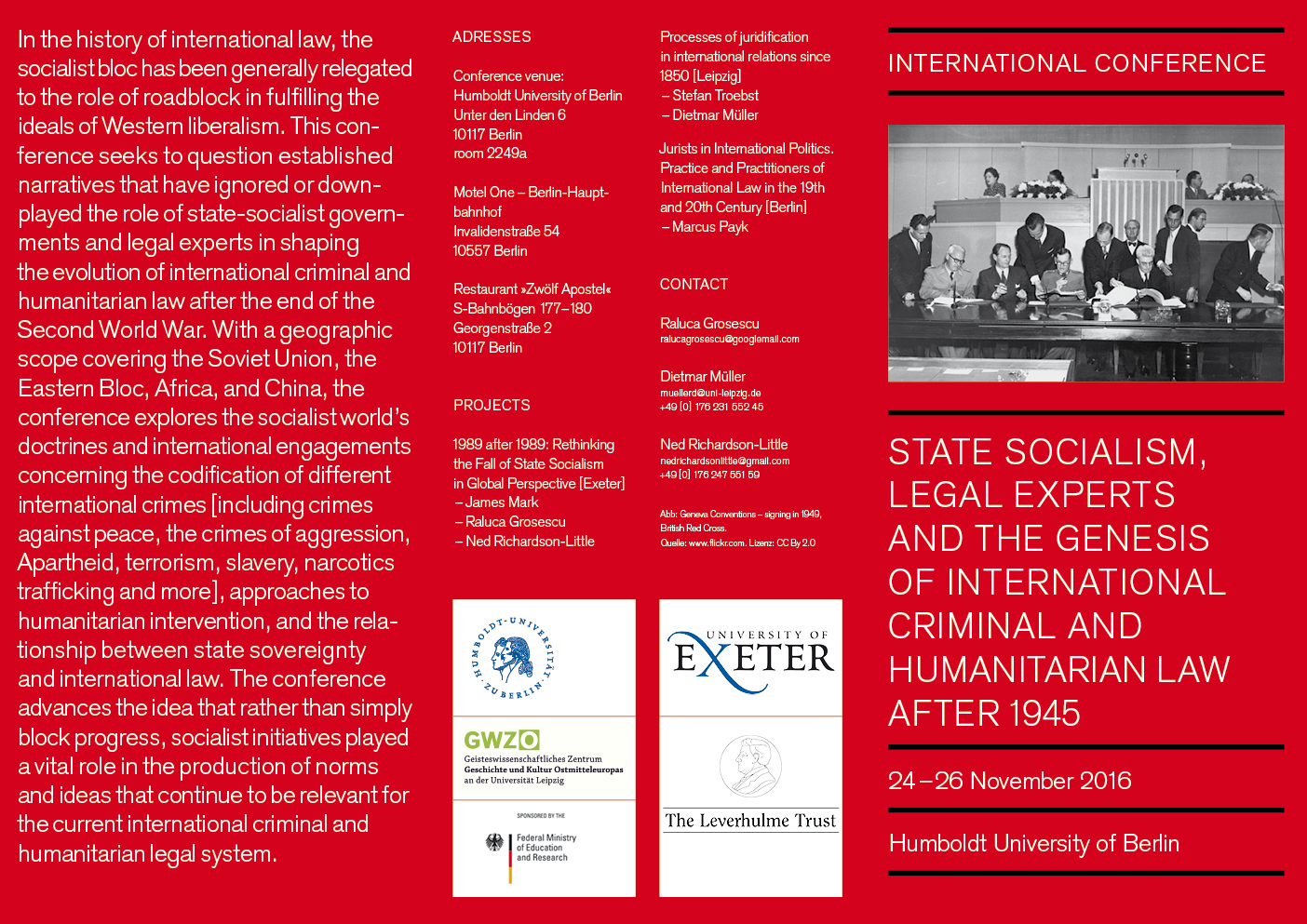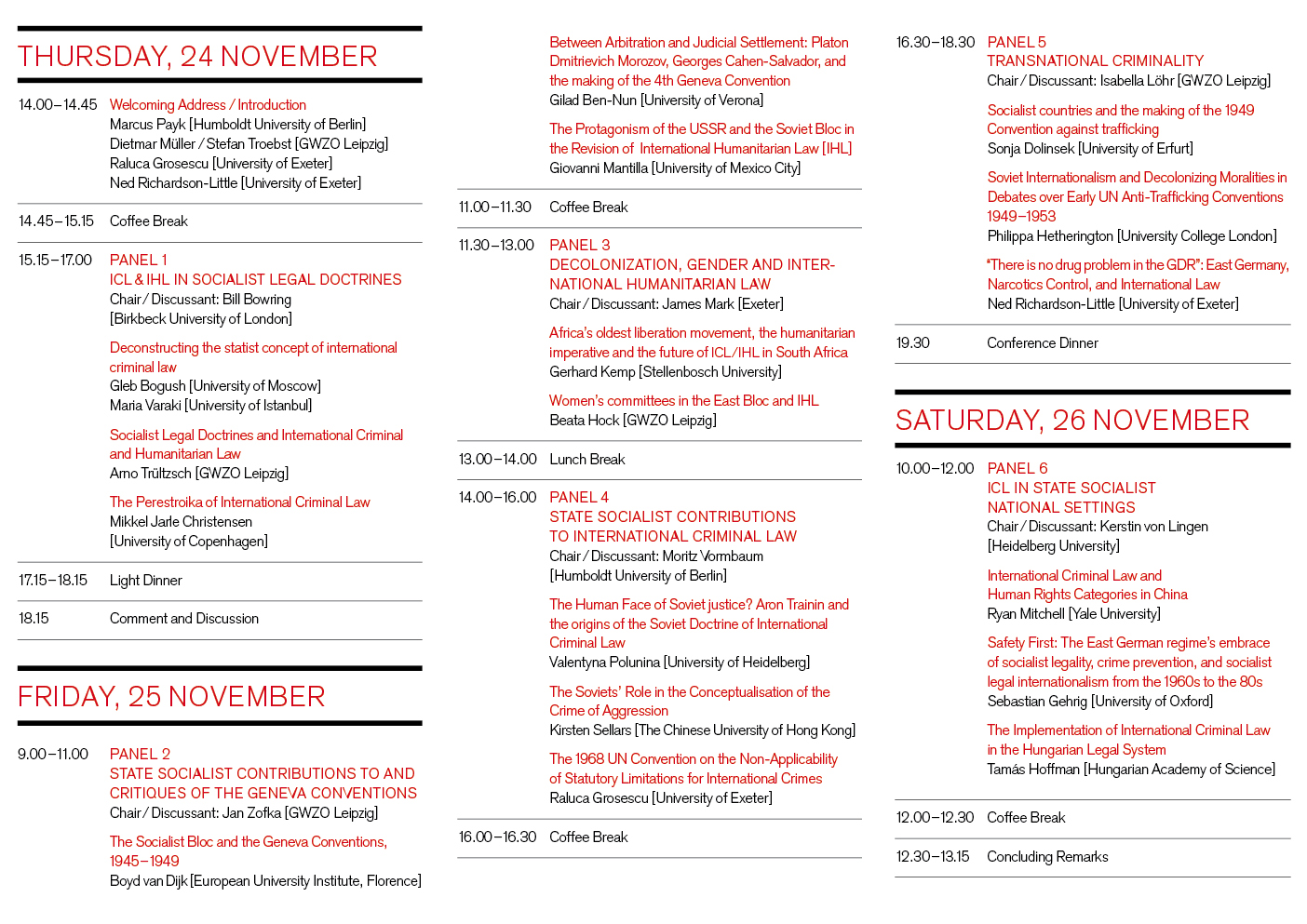Over the last half century, discourses and practices connected to the idea that violent or dictatorial pasts should be marked as criminal have proliferated. A variety of actors – from victims groups to social movements, to expert groups such as lawyers, museums specialists and even economists – have contributed to the emergence and circulation of the notion that political violence could only be overcome through its criminalization in courts, lustration procedures, history writing, activism or memorial sites. Produced across different fields of action and expertise, this assumption has become dominant in the political and judicial sphere at a global level and has permeated many political cultures and everyday life practices. Even where decriminalisation (amnesties, pardons, closure of archives) prevailed, debates worked within the set of assumptions about the past established through this globally expanding paradigm.
Despite its dominance, we still lack a truly international history of its roots. This is in part because modern day practices of criminalisation often play down their own historicity. Coming of age at the so-called ‘end of history’, their promoters came to see their application as a natural end point in the achievement of human rights, democracy or good governance. When histories are offered, they too often provide a rather linear narrative that links these developments to – mainly Western – political processes established to address the legacies of Nazism after World War Two. Such accounts have also commonly resisted incorporation into broader frameworks supplied, for example, by histories of globalization, neoliberalism or postcolonialism. Only recently have a few authors sought to make sense of the emergence of the modern criminalisation paradigm in new ways, connecting it, for example, to the rise of the homo economicus and a concomitant individualistic approach to human rights.
This conference seeks to explore the history of the (often forgotten) pathways and contested visions through which the criminalization paradigm developed. This conference welcomes contributions that explore the emergence of multiple, potentially competitive visions of criminal pasts. Taking as its starting point the moment of an acceleration of decolonisation, globalisation and de-Stalinisation in the 1950s, we encourage papers that explore the variety of actors, activisms and political projects that lay behind the global expansion of such ideas. Human rights organisations, international legal associations, post-colonial and Communist states, all variously developed the idea of overcoming criminal pasts as they sought, to legitimate new political projects, reconceptualise the relationship between the individual and the state, or seek collective or socio-economic justice for past wrongs. We welcome papers that, for example, address the complexity and interplay of these ideas in different arenas and seek to connect these phenomena to wider literatures. We are also wary of easy teleologies, and are as interested in the histories of the marginalization of some visions, as in the growing dominance of others.
Papers might address the following topics:
Historicisation. How did processes of criminalisation/decriminalisation of fascism, authoritarianism, colonialism, communism, and other violent historical episodes evolve over time? What were their political/ideological roots and consequences, and how did they influence each other? Which particular paradigms of criminalisation were internationalised or globalised from the 1950s? What turning points can we identify in the shift of these paradigms at international and regional levels (e.g. decolonisation in the 1960s, the end of Cold War)?
Rethinking Paradigms. Are there new historical frameworks into which the history of criminalising violent pasts could be written? The history of neoliberalism? Or postcolonialism? Should it bring together traditions of scholarship, which have often remained separate? (e.g. postcolonialism and communism; histories of the ‘semi-periphery’ with those from ‘the West’).
Rethinking ‘Third Wave Criminalisation’ (1980s-). How might these multiple histories help us understand the values and practices of ‘third wave criminalisation’ in new ways? Which groups and alliances helped produce this? Were alternative visions of historical culpability marginalised, or did they survive? Does such a historicisation enable us more fully to appreciate the variety of visions and practices that constitute this recent criminalisation paradigm?
Rethinking Actors. How did states, social movements, peace keepers, or experts produce ideas about what should be criminalised and in which ways? How did actors generally unrecognised – such as socialist and other authoritarian states, or professional groups such as economists –produce and globalise new paradigms? Do we over-privilege the role of western actors in this account? How do relevant actors change over time? (e.g. from states to non-state actors including private individuals and companies)?
Rethinking Chronologies. How did the meanings, relevance and objects of criminalisation shift over time? How were specific crimes selected as subject to criminalisation at particular moments, which were sidelined, and why? How are the processes of criminalisation linked to processes of politicization or de-politicisation of past conflicts and violence? Was there a move from collective/ systemic criminalisation to one based around the idea of individual crime and responsibility?
Abstracts of 300-500 words, together with an accompanying short CV should be submitted to criminalisingviolentpasts@gmail.com by 31 May 2018. The selected participants will be notified by the end of June 2018. Financial support for travel and accommodation is available, but we ask that contributors also explore funding opportunities at their home institutions.
This conference is supported by the AHRC “Care for the Future” (UK) and Labex “Les Passés dans Le Présent” (FR) joint funded project The Criminalization of Dictatorial Pasts in Europe and Latin America in Global Perspective.








 Conference Venue:
Conference Venue:
